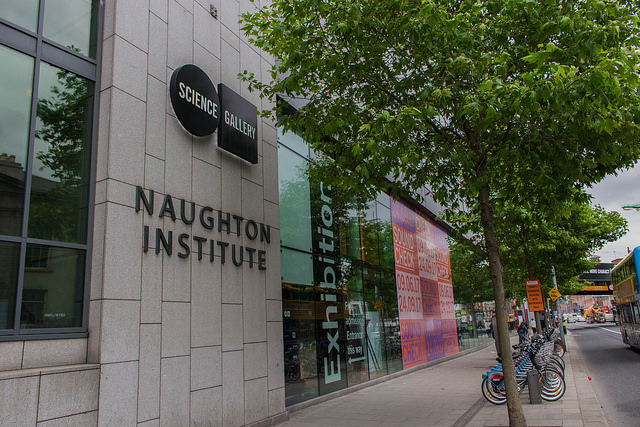The future of Trinity’s beloved Science Gallery is in doubt – the reason provided for its potential demise being that it is no longer “financially viable”. Such reasoning begs the question: should artistic exhibitions of science and innovation be profitable?
Of course, art galleries are used to seeing particular works being assigned commercial figures, but such works, housed in the National Gallery of Ireland, for example, are still free to visit. The same standard of free entry to allow everyone to avail of the cultural and educational benefits of art is implemented across galleries, libraries and museums across the globe. Such cultural institutions and their comprehensive accessibility are seen as essential to any functioning, civilised society. Should public libraries be closed because they do not generate income? Perhaps the valuable real-estate of the National Library and National Archaeological Museum on Kildare St could be made more profitable as hotels or rental apartments?
In the present climate of demolition, dereliction and debasement which currently runs rampant across the Dublin, all under the cloak of progression and of course, financial viability, I think our conception of value requires a careful rethink. Art and culture consistently struggle against being undervalued and underfunded, while still expected to be readily rolled out as convenient showpieces for visitors and events.
The pandemic has been particularly devastating for the cultural sector. Like many other venues, the Science Gallery was forced to close for a sustained period of time during restrictions, a likely contributing factor to its financial trouble. What does that really say about our society, or about Trinity, if we allow a single year of restrictions to flatten one of our most valuable educational spaces?
Cultural institutions are seen as essential to any functioning, civilised society. So should public libraries be closed because they do not generate income?
Trinity invites new students to realise their full potential and to be inspired. If the College is to close such innovative spaces, I wonder what there will be left to feel inspired by. The large tourist pavilion mooted to be erected on the cricket pitch for the next three to five years? Such investments are perhaps more revealing of the college’s ethos. If the Science Gallery is such a drain on College resources, why not apply for a grant for it?
If one really wants to talk money – art, architecture and heritage are one of the main driving forces behind Ireland’s tourism economy, estimated to have been worth €9.3 billion in 2019.
Art and culture struggle against being undervalued and underfunded, while still expected to be readily rolled out as convenient showpieces for visitors and events
I am hopeful that one of the first actions in the new Provost’s first year – a provost whose passion for the marriage of science and art impressed voters – will be to counteract the closing of a multi-disciplinary space with thought-provoking, interactive exhibits. The Naughton Institute, which houses the Science Gallery, was completed just 14 years ago in 2007 and provides labs, offices, a theatre and event spaces. It can be accessed from Pearse St without needing to traipse across the campus, and is accessible to students, staff and the public alike. Where else could art and science collide and be available for such a diverse audience?
The “gallery” is hardly a drain on floor space: it is a humble building one could easily walk past on their way to a (financially viable?) coffee shop beyond.The glass frontage, however, has allowed eye-catching displays for passers-by on an otherwise grey, traffic-choked thoroughfare. Despite, or perhaps because of, these space limitations, it has thrived with hugely popular exhibits and an innovative team, the invaluable experiences of whom will undoubtedly serve the future of Ireland’s cultural economy very well.
Has an alternative income generator been mooted for this small space? Overpriced student bedsits, perhaps?
Dublin is currently in a crisis of dereliction, demolition, and debasement which runs rampant across the capital city, all under the cloak of progression and of course, financial viability. Vacant, mostly historical properties rot whilst homelessness and the exploitation of rising rental and property prices increase outrageously. Just last month, student flats were switched for use as private lets whilst the student accommodation crisis tore on. All in the name of financial viability. Such crises may be outside the remit of the College’s Board, but it is this philosophy of prioritising finance above all else which leads to such devaluing of the cultural industries.
Financial viability aside, acts such as the closing of galleries in any society are a foreboding of the slow-burn of thought-control under which capital is king, while the human endeavour to interpret and question the world around us loses all value.







